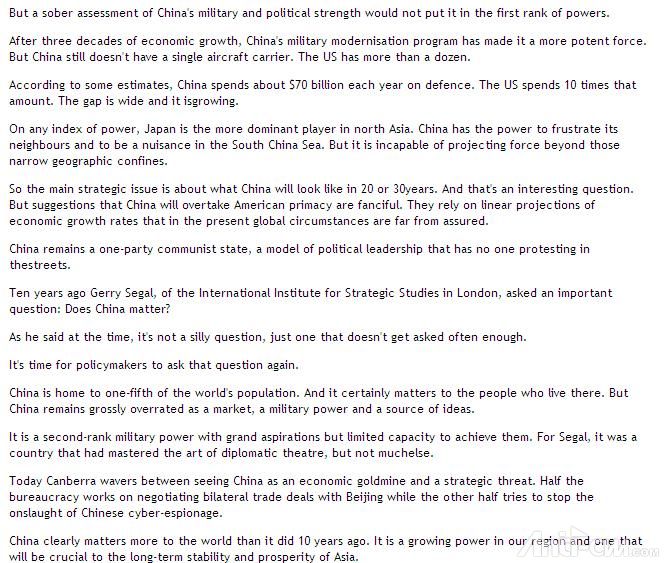|
|
本帖最后由 magicboy 于 2009-4-27 01:26 编辑
【标题】China is no great power
中国不是大国,更像19世纪的意大利
【原文链接】http://www.theaustralian.news.com.au/story/0,25197,25335163-5013479,00.html
【时间】April 15, 2009
【正文】
CHINA looms large in Australian foreign and defence policy debates at the moment. From investment in our resource companies to cyber-espionage, the local commentariat seems fascinated by every detail of the Middle Kingdom and its nefarious activities.
The Weekend Australian reported last Saturday that assessments of China are the subject of high-level bureaucratic dispute among the defence and intelligence agencies. Cameron Stewart and Patrick Walter's report said that resolving these disputes would be the central theme of the forthcoming defence white paper.
The rise-of-China thesis is being touted by some strategic analysts as the principal challenge of our generation. It's not, and here's why.
China is not a great power, by any stretch of the imagination. Those who paint it as such either don't understand the nature of power in the international system or are wilfully mischievous. A great power is one that has global reach and influence. Britain in the mid-18th century was such a power, single-handedly defeating the combined navies of France and Spain.
The Soviet Union achieved great-power status after World War II, but mostly because of its primacy among the communist countries in the ideological struggle with the West.
Today, only the US is a great power. Abraham Lincoln instinctively knew this in 1838 when he said, "All the armies of Europe, Asia and Africa combined, with all the treasure of the earth in their military chest, with a Buonaparte for a commander, could not by force take a drink from theOhio."
A great power is one whose total destruction would require a coalition of other powers. Great power also describes a position of leadership and a moral purpose. None of these things describe China.
China today is like Italy of the 19thcentury, a mid-ranking power with a big appetite but poor teeth. China wants to prove itself in the councils of the world. And Beijing has made some strides towards being a more responsible stakeholder in the international system.
But a sober assessment of China's military and political strength would not put it in the first rank of powers.
After three decades of economic growth, China's military modernisation program has made it a more potent force. But China still doesn't have a single aircraft carrier. The US has more than a dozen.
According to some estimates, China spends about $70 billion each year on defence. The US spends 10 times that amount. The gap is wide and it isgrowing.
On any index of power, Japan is the more dominant player in north Asia. China has the power to frustrate its neighbours and to be a nuisance in the South China Sea. But it is incapable of projecting force beyond those narrow geographic confines.
So the main strategic issue is about what China will look like in 20 or 30years. And that's an interesting question. But suggestions that China will overtake American primacy are fanciful. They rely on linear projections of economic growth rates that in the present global circumstances are far from assured.
China remains a one-party communist state, a model of political leadership that has no one protesting in thestreets.
Ten years ago Gerry Segal, of the International Institute for Strategic Studies in London, asked an important question: Does China matter?
As he said at the time, it's not a silly question, just one that doesn't get asked often enough.
It's time for policymakers to ask that question again.
China is home to one-fifth of the world's population. And it certainly matters to the people who live there. But China remains grossly overrated as a market, a military power and a source of ideas.
It is a second-rank military power with grand aspirations but limited capacity to achieve them. For Segal, it was a country that had mastered the art of diplomatic theatre, but not muchelse.
Today Canberra wavers between seeing China as an economic goldmine and a strategic threat. Half the bureaucracy works on negotiating bilateral trade deals with Beijing while the other half tries to stop the onslaught of Chinese cyber-espionage.
China clearly matters more to the world than it did 10 years ago. It is a growing power in our region and one that will be crucial to the long-term stability and prosperity of Asia.
But Segal's assessment is still closer to the mark. And until policymakers in Canberra fully appreciate that fact, wewill continue to get our China policy wrong.
Carl Ungerer is director of the national security project at the Australian Strategic Policy Institute in Canberra. These are his personal views.
译文转载自:http://blog.sina.com.cn/s/blog_48670cb20100cxdr.html
不论怎么想像,中国都算不上一个大国。那些把中国视为大国的人,要么不理解国际体系中实力的本质,要么是有意制造是非。一个大国意味着具有全球性辐射和影响力。18世纪中叶的英国属于这样的大国,凭藉一己之力击败了法国和西班牙的联合海军。苏联在二战后也取得了大国地位,但基本上是由于它是与西方进行意识形态斗争的共产主义国家的龙头。今天,只有美国才是大国。要想彻底摧毁一个大国有赖于其他国家的联合。大国也意味着一种领袖地位和道德目标。而中国不具备上述特征。
今日中国更像是19世纪的意大利,属于一个中等国家,胃口很大而牙齿不行。中国想要在世界上证明自己。北京是在朝向成为国际体系中更负责任的一员方面取得了一些进步。但对中国的军事和政治实力进行冷静评估后会发现,中国算不上是一流强国。
经过30年经济增长后,中国军事现代化造就了一支更有力的军队。但中国仍无一艘航空母舰。而美国拥有航母十多艘。据估计,中国每年的国防开支约为700亿美元。美国的军费是该数字的10倍。差距正变得越来越大。从任何实力指数来衡量,日本都是东北亚更具优势的国家。中国有实力击败其邻国以及在南海呼风唤雨。但它无力超越狭窄的地理限制投放力量。
所以,主要战略问题在于今后二三十年中国将会变得怎样。这是个有趣的问题。但若认为中国将超过美国占据主导地位那就是空想了。他们依照的是经济增长率的线性预测,而在当前全球背景下这是相当靠不住的。
10年前,伦敦国际战略研究所的格里•西格尔提出一个问题:中国重要吗?在当时这不是个愚蠢问题,只是被问得不够多。现在该是决策者重提这个问题的时候了。
中国拥有世界1/5人口,它对生活在那里的人当然重要。但中国作为市场、军事强国和思想之源被大大高估了。中国只是一个二流军事强国,雄心勃勃而能力有限。对西格尔来说,中国只是掌握了外交舞台艺术,别的就没有什么了。
如今,堪培拉在把中国视为经济金矿和战略威胁之间摇摆不定。中国显然比10年前更重要了。这是我们地区日益崛起的国家,幷将是亚洲长期稳定和繁荣的关键。但西格尔的评估仍然站得住脚。只有当堪培拉的决策者充分认识到这一事实,我们才会摆正我们的中国政策。
【截图】




|
中国, 大国, 意大利, 澳大利亚人, 中国, 大国, 意大利, 澳大利亚人, 中国, 大国, 意大利, 澳大利亚人
|